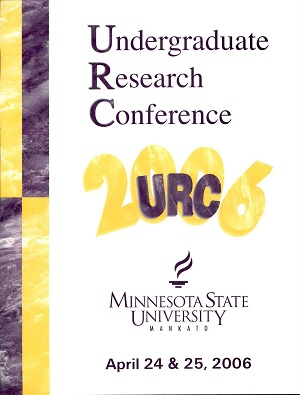Climate Change, Famine and Witches: A New Interpretation of the European Witch Hunts
Location
CSU 284
Start Date
24-4-2006 3:15 PM
End Date
24-4-2006 5:00 PM
Student's Major
History
Student's College
Social and Behavioral Sciences
Mentor's Name
Christopher Corley
Mentor's Department
History
Mentor's College
Social and Behavioral Sciences
Description
Many scholars in our society are concerned with the environmental and economic effects of global climate change, but they spend little time considering its long-term social and cultural impact. On the other hand, History has something to teach us about the effects of weather patterns on past peoples. For example, historians have shown that climate change had a devastating impact on Europe's population in the sixteenth and seventeenth centuries. They have also made suggestive links between climate change and the rise of the witch hunts. In these perspectives, agricultural crises precipitated by poor weather created hostile village relationships that resulted in accusations of witchcraft. There are two problems with this view: First, European peasant farmers had experienced misfortune for centuries without resorting to violence framed by accusations of witchcraft. Second, widespread witch hunts existed as early as the fourteenth and fifteenth centuries.
My research shows that there is indeed a link between climate change and witch hunts, but that the concern emerged from the elites' fears of weather magic, not from villagers. Throughout the early and high Middle Ages, elite theologians expressed little concern about weather magic. It was not until Europe experienced climate catastrophes in the fourteenth century, followed by widespread famine and plague, that weather became an issue for the elites. My interpretation shows that the elites were to blame for the witch hunts as climate change threatened their material well-being. Only later were these fears passed to villagers through woodcut illustrations and sermons.
Climate Change, Famine and Witches: A New Interpretation of the European Witch Hunts
CSU 284
Many scholars in our society are concerned with the environmental and economic effects of global climate change, but they spend little time considering its long-term social and cultural impact. On the other hand, History has something to teach us about the effects of weather patterns on past peoples. For example, historians have shown that climate change had a devastating impact on Europe's population in the sixteenth and seventeenth centuries. They have also made suggestive links between climate change and the rise of the witch hunts. In these perspectives, agricultural crises precipitated by poor weather created hostile village relationships that resulted in accusations of witchcraft. There are two problems with this view: First, European peasant farmers had experienced misfortune for centuries without resorting to violence framed by accusations of witchcraft. Second, widespread witch hunts existed as early as the fourteenth and fifteenth centuries.
My research shows that there is indeed a link between climate change and witch hunts, but that the concern emerged from the elites' fears of weather magic, not from villagers. Throughout the early and high Middle Ages, elite theologians expressed little concern about weather magic. It was not until Europe experienced climate catastrophes in the fourteenth century, followed by widespread famine and plague, that weather became an issue for the elites. My interpretation shows that the elites were to blame for the witch hunts as climate change threatened their material well-being. Only later were these fears passed to villagers through woodcut illustrations and sermons.
Recommended Citation
Gish, Adam. "Climate Change, Famine and Witches: A New Interpretation of the European Witch Hunts." Undergraduate Research Symposium, Mankato, MN, April 24, 2006.
https://cornerstone.lib.mnsu.edu/urs/2006/oral-session-I/1




